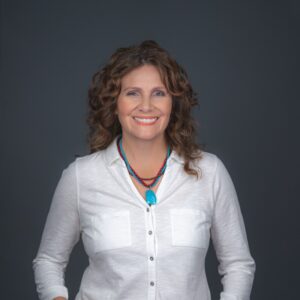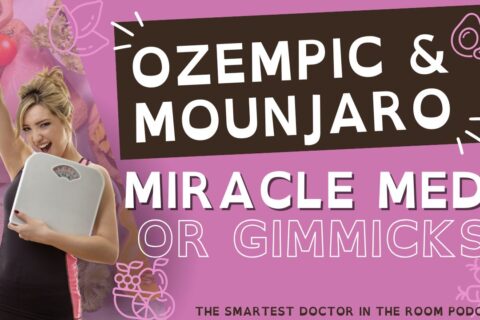Uncovering the Power of Naturopathy: When Conventional Medicine Isn’t Enough
CONNECT WITH US:
In today’s fast-paced world, more people are turning to alternative medicine in search of answers that conventional approaches may not provide. This trend isn’t new—holistic practices have been around for centuries—but recently, they’ve gained renewed interest, particularly in treating chronic and complex health issues. Let’s explore the insights shared by Dr. Deborah Muth, a distinguished naturopathic doctor (ND) and founder of Serenity Health Center, during her recent conversation with Dr. Dean Mitchell on “The Smartest Doctor in the Room” podcast.
Dr. Muth discusses her journey from a conventional nursing background to pioneering naturopathy and reveals how this approach can be life-changing for those who feel conventional medicine has failed them.
Dr. Muth’s Story: A Journey from Conventional to Naturopathic Medicine
Dr. Muth started her career in traditional nursing, advancing quickly to become a nurse practitioner. However, after facing her own severe health challenges that conventional medicine could not adequately address, she decided to look beyond the usual avenues. “I walked into the doctor’s office at 28, expecting answers, and was instead handed a prescription for narcotics and antidepressants,” she recalls. “I knew then that I needed to find another way.”
This realization led her to naturopathy, a practice that emphasizes holistic healing, natural remedies, and a deep understanding of how lifestyle, diet, and natural supplements can affect our health. Now a recognized expert in her field, Dr. Muth uses her knowledge to help patients with chronic illnesses find relief where other methods have failed.
Understanding Naturopathy: What Sets It Apart?
Naturopathy is a distinct medical field that combines traditional healing methods with modern scientific knowledge. Unlike conventional medicine, which often focuses on treating symptoms, naturopathy aims to address the root cause of an illness. Naturopathic doctors (NDs) are trained in both conventional and natural medicine, giving them a comprehensive understanding of human health.
Dr. Muth explains that NDs undergo rigorous training similar to that of medical doctors (MDs), including courses in anatomy, physiology, and biochemistry, along with specialized training in natural therapies such as nutrition, herbal medicine, and lifestyle counseling. “We learn how to use plants, foods, and natural compounds to promote healing,” Dr. Muth notes, “and we understand the origins of many conventional medications, which are often derived from natural sources.”
Key Differences Between NDs and MDs
While MDs focus primarily on diagnosing diseases and prescribing medications or surgeries, NDs offer a more integrative approach that includes:
- Personalized Treatment Plans: NDs spend more time understanding each patient’s unique situation, creating tailored plans that address lifestyle, diet, stress, and environmental factors.
- Focus on Prevention: Naturopathy emphasizes preventing illness by maintaining a healthy lifestyle and using natural remedies to support overall well-being.
- Holistic Approach: NDs consider the whole person, including mental, emotional, and physical health, rather than just treating isolated symptoms.
Addressing Common Misconceptions About Holistic Medicine
Holistic medicine, including naturopathy, is sometimes viewed skeptically by conventional practitioners. However, there is growing evidence to support its effectiveness, particularly for chronic illnesses. A recent study published in the Journal of Complementary and Integrative Medicine found that patients who used naturopathic treatments for conditions like arthritis, cardiovascular diseases, and anxiety reported higher satisfaction and fewer side effects than those using conventional therapies alone.
Moreover, according to the National Center for Complementary and Integrative Health (NCCIH), nearly 40% of American adults use some form of complementary or alternative medicine. This growing trend underscores the importance of integrating holistic approaches into mainstream healthcare, particularly for patients with chronic conditions where conventional methods may not be sufficient.
Understanding Candida and Mycotoxin Illnesses
 One of the key topics Dr. Muth discusses is the treatment of Candida overgrowth and mycotoxin illnesses, conditions that are often misunderstood or misdiagnosed in conventional medicine. Candida is a type of yeast that naturally lives in the body, but an overgrowth can lead to various health issues, such as fatigue, digestive problems, and skin infections. Mycotoxins, on the other hand, are toxic substances produced by mold, which can lead to chronic fatigue, respiratory issues, and neurological symptoms if exposure is prolonged.
One of the key topics Dr. Muth discusses is the treatment of Candida overgrowth and mycotoxin illnesses, conditions that are often misunderstood or misdiagnosed in conventional medicine. Candida is a type of yeast that naturally lives in the body, but an overgrowth can lead to various health issues, such as fatigue, digestive problems, and skin infections. Mycotoxins, on the other hand, are toxic substances produced by mold, which can lead to chronic fatigue, respiratory issues, and neurological symptoms if exposure is prolonged.
Dr. Muth emphasizes the importance of thorough testing and a multi-faceted approach to treatment. She advocates for using a combination of stool tests, blood tests, and intradermal skin tests to accurately diagnose these conditions. “I never rely on just one test,” she says, “because each has its limitations. A comprehensive approach ensures we get to the root of the problem.”
Effective Natural Remedies: Herbs, Diet, and Supplements
For treating conditions like Candida and mycotoxin illnesses, Dr. Muth recommends various natural remedies, including:
- Herbs like Pau d’Arco, Olive Leaf, and Garlic: These have antifungal properties and can help control Candida overgrowth without the harsh side effects of some prescription medications.
- Dietary Changes: A low-sugar, anti-inflammatory diet can help reduce symptoms by depriving yeast of its primary fuel source. Dr. Muth often starts with a strict elimination diet and then gradually reintroduces foods to identify triggers.
- Detoxification Support: Supplements like milk thistle, glutathione, and NAC (N-Acetyl Cysteine) help support the liver and enhance the body’s natural detoxification pathways.
Dr. Muth also stresses the importance of “prepping the body” before starting any antifungal or detox regimen. This involves supporting liver function and ensuring proper digestive health to minimize potential side effects, such as Herxheimer reactions or “die-off” symptoms.
When to Choose a Naturopathic Doctor?
Dr. Muth believes that anyone dealing with a chronic illness or autoimmune disease should consider consulting a naturopathic doctor. “NDs look at things differently. We support the immune system uniquely, and we understand the role of diet, toxins, and environment in chronic conditions,” she says.
A growing body of evidence supports this approach. For example, research published in BMC Complementary Medicine and Therapies shows that integrative health approaches, including naturopathy, are associated with significant improvements in health outcomes and quality of life for people with chronic conditions.
Navigating Chronic Illness with Holistic Approaches
For patients with complex conditions who feel stuck, a holistic approach can be particularly beneficial. Naturopathic doctors like Dr. Muth or holistic doctors like Dr. Dean Mitchell often work alongside conventional practitioners to offer complementary therapies that may provide relief where other treatments have failed. By combining evidence-based natural therapies with conventional medicine, patients can often achieve better health outcomes.
Final Thoughts and Key Takeaways
If you’ve been struggling with chronic health issues and feel that conventional medicine hasn’t provided adequate answers, exploring naturopathy might be worth considering. The holistic, personalized approach that naturopathic doctors offer can provide new perspectives and potential solutions that conventional practices might overlook.
Dr. Muth’s journey is a testament to the power of integrative medicine and the importance of not giving up, even when conventional methods fall short. “Medicine is changing rapidly,” she says, “and there are always new options emerging. Keep searching, keep asking questions, and don’t give up.”
About the Author – Dr. Dean Mitchell, M.D.

Dr. Dean Mitchell M.D. is a Board-Certified Immunologist and Allergist based out of NYC. He graduated from the Sackler School of Medicine and completed training at the Robert Cooke Allergy Institute in New York City. He is also a Professor of Clinical Immunology at Touro College of Osteopathic Medicine, a fellow of the American Academy of Allergy, Asthma, and Immunology, and the author of Allergy and Asthma Solution: The Ultimate Program for Reversing Your Symptoms One Drop at a Time. Dr. Dean Mitchell, M.D. has also been featured in The New York Times, The Huffington Post, Fitness Magazine, Dr. Oz, and News NY 1. Dr. Mitchell also hosts the podcast The Smartest Doctor in the Room – a combination of a lively, personal, and in-depth interviews with top healthcare specialists.
References:

